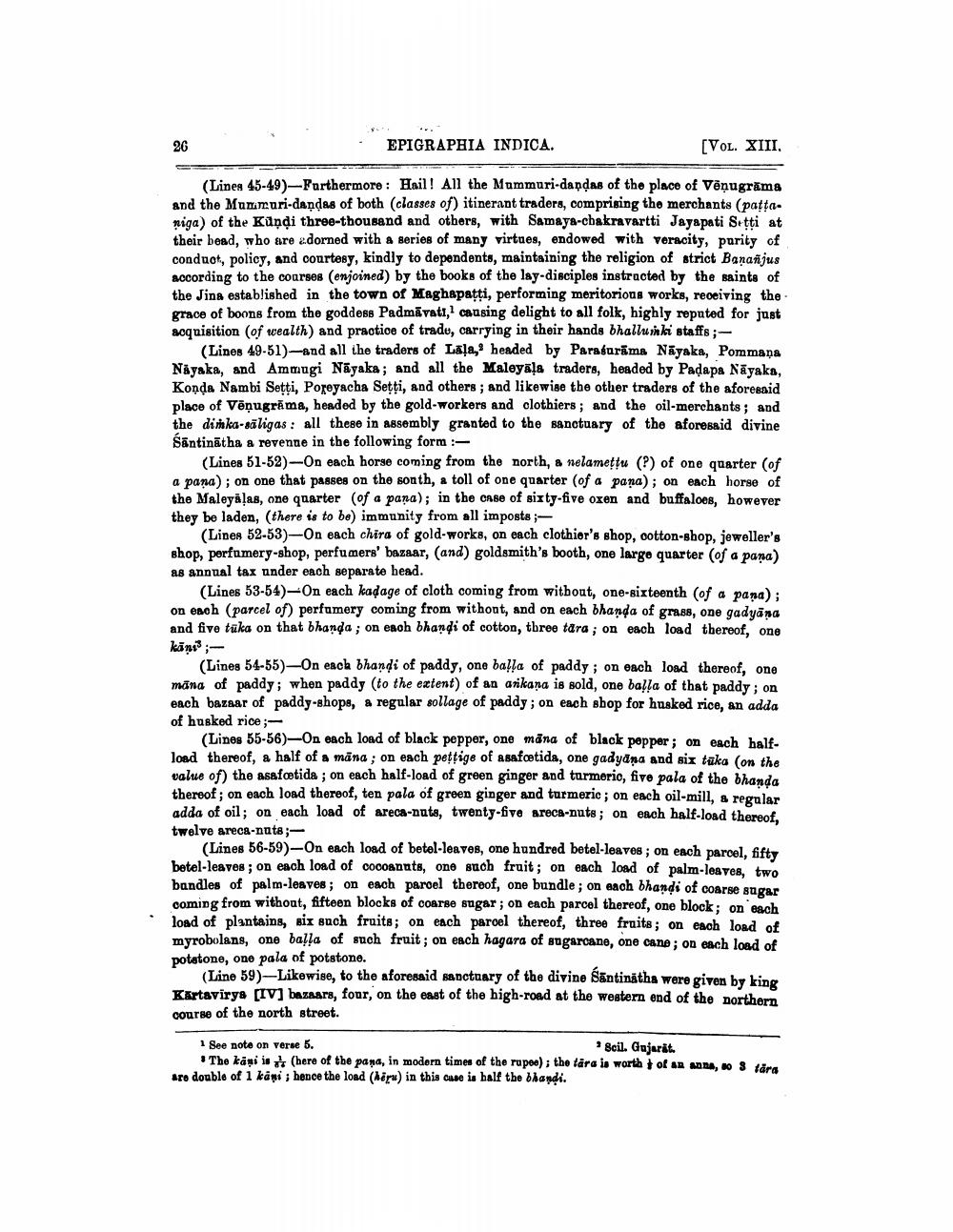________________
-
EPIGRAPHIA INDICA.
(VOL. XIII.
(Linea 45-49)-Furthermore : Hail! All the Mammuri-dandas of the place of Vēņugrāma and the Murunguri-dandas of both (classes of) itinerant traders, comprising the merchants (patta. niga) of the Kündi three-thousand and others, with Samaya-chakravartti Jayapati Setti at their bead, who are adorned with a series of many virtues, endowed with veracity, purity of conduct, policy, and courtesy, kindly to dependents, maintaining the religion of strict Bananijus according to the courses (enjoined) by the books of the lay-disciples instructed by the saints of the Jina established in the town of Maghapatti, performing meritorious works, receiving the grace of boons from the goddess Padmāvati, causing delight to all folk, highly reputed for just acquisition (of wealth) and practioe of tradu, carrying in their hands bhallunki staffs :
(Lines 49-51)--and all the traders of Lala, headed by Parafurāms Nāyaka, Pommaņa Nayaka, and Ammugi Nāyaka; and all the Maleyāļs traders, headed by Padapa Nāyaka, Konda Nambi Setti, Poreyacha Setti, and others; and likewise the other traders of the aforesaid place of Vēņugrima, headed by the gold-workers and clothiers; and the oil-merchants; and the dimaka-sáligas : all these in assembly granted to the sanctuary of the aforesaid divine śāntinātha a revenge in the following form :
(Lines 51-52)-On each horse coming from the north, a nelamettu (?) of one quarter of a pana); on one that passes on the sonth, a toll of one quarter (of a pana); on each horse of the Maleyaļas, one quarter (of a pana); in the case of sixty-five oxen and buffaloes, however they be laden, (there is to be) immunity from all imposta ;
(Lines 52-53)-On each chira of gold-works, on each clothior's shop, ootton-shop, jeweller's shop, perfumery-shop, perfumers' bazaar, (and) goldsmith's booth, one large quarter of a pana) as annual tax under each separate head.
(Lines 53-54)-On each kadage of cloth coming from without, one-sixteenth (of a pana); on each parcel of) perfumery coming from withont, and on each bhanda of grass, one gadyāna and five tuka on that bhanda ; on each bhandi of cotton, three tara; on each load thereof, one kānis ;
(Lines 54-55)-On each bhandi of paddy, one baļļa of paddy ; on each load thereof, one māna of paddy; when paddy (to the extent) of an arikana is sold, one balla of that paddy; on each bazaar of paddy-shope, a regular sollage of paddy ; on each shop for husked rice, an adda of husked rice;
(Lines 55-56)-On each load of black pepper, one mana of black pepper; on each halfload thereof, a half of a mana; on each pettige of asafoetida, one gadyana and six taka (on the value of) the asafoetida ; on each half-load of green ginger and turmerio, five pala of the bhanda thereof; on each load thereof, ten pala of green ginger and turmeric; on each oil-mill, a regular adda of oil; on each load of areca-nats, twenty-five sreca-nuts; on each half-load thereof. twelve areca-nute;
(Lines 56-59)-On each load of betel-leaves, one hundred betel-leaves; on each parool, fifty betel-leaves; on each load of cocoanats, one such fruit; on each load of palm-leaves, two bandles of palm-leaves ; on each parcel thereof, one bundle ; on each bhandi of coarse sugar coming from without, fifteen blocks of coarse sugar; on each parcel thereof, one block; on each load of plantains, six euch fruits; on each paroel thereof, three fruits ; on each load of myrobolans, one baļļa of such fruit; on each hagara of sugarcane, one cane; on each load of potatone, one pala of potstone.
(Line 59)-Likewise, to the aforesaid sanctuary of the divine Santinātha were given by king Kartavirya [IV] bazaars, four, on the east of the high-road at the western end of the northern course of the north street.
1 See note on verse 5.
Scil. Gajarit. • The kani is (here of the pana, in modorn times of the rupoo), the lara is worth of an ADDA, 10 3 tara aro double of 1 kami ; hence the load (hēru) in this use is half the bhandi.




